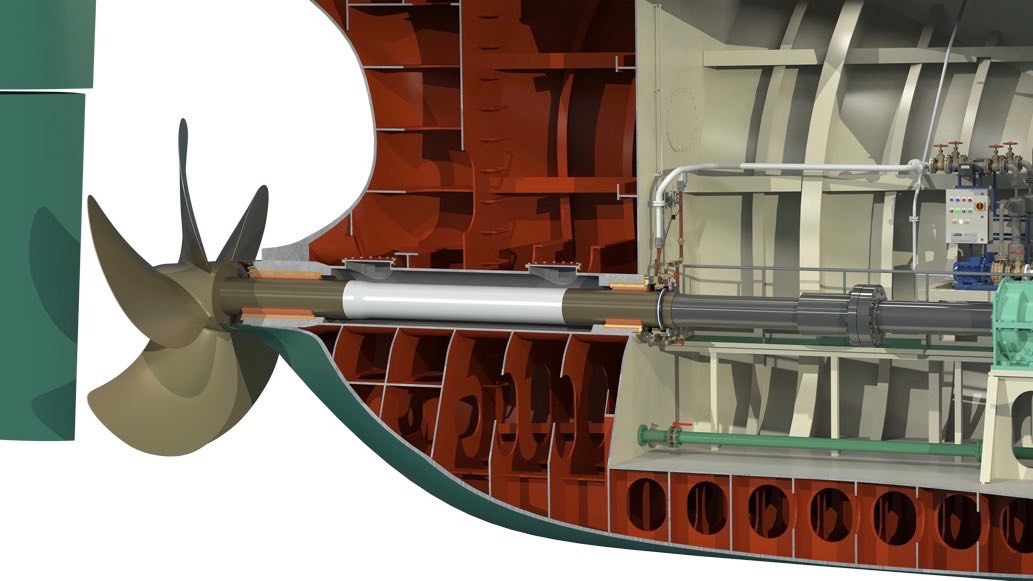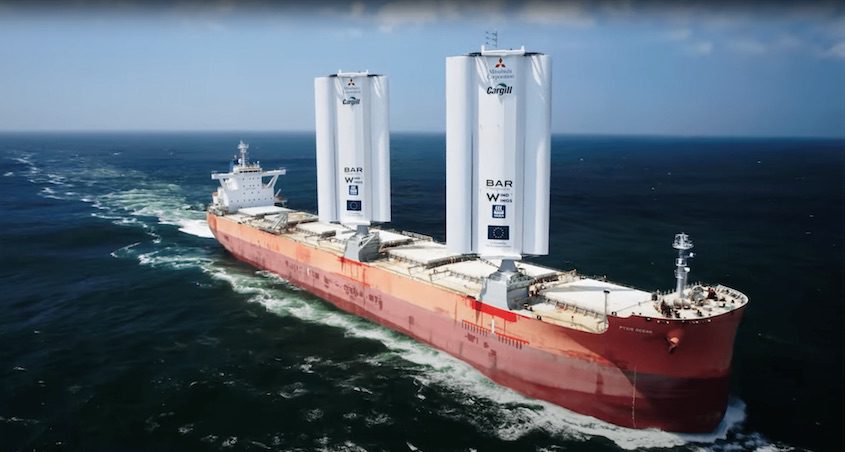28 November 2024
Seawater lubricated shaft line to reduce emissions

To have truly zero-emissions ships, the shipping industry has to get rid of the oil-lubricated shaft line and replace it with one lubricated by seawater.
The global maritime industry is making significant progress in the fight to reduce ship greenhouse gasses and other ship-to-air emissions. But it should not lose sight of what’s going on below the waterline. Thordon Bearings’ Craig Carter addressed members of the World Ocean Council (WOC).
Concept
Speaking in Barcelona on the first day of the WOC’s Sustainable Ocean Summit, Thordon’s Vice-President of Business Development said that there are today a number of initiatives looking at reducing emissions above the waterline. However, there are not so many looking at preventing pollution below the waterline. This can be part of global policies to improve our oceans and seas under the United Nations’ Sustainable Development Goals. Number 14 – Life Below Water.
In answer to a question raised during the Sustainable Ports and Shipping for the Blue Economy session, Carter replied.
“To further advance ocean sustainable development and put to sea truly zero-emissions ships, then we really do have to get rid of the oil-lubricated shaft line and replace it with one lubricated by seawater. From well to wake, the environmental impact of an oil-lubricated sterntube needs serious consideration.”
Craig Carter, Vice-President of Business Development, Thordon Bearings
Why Not Oil?
According to numerous environmental data sources, Carter estimated conservatively that leaks from the global shipping fleet’s propeller shafts resulted last year in more than 60 million gallons of oil polluting the world’s seas and oceans.
“This is about the same as the Amoco Cadiz spill, but it’s happening year after year after year. Oil-lubricated propeller shafts are often considered to be sealed systems, but they’re not. If they were, then a ship’s oil header tank containing 2000-3000 litres of oil wouldn’t need topping up with oil every few years!”
Craig Carter, Vice-President of Business Development, Thordon Bearings
While damaged and worn, sterntube seals contribute massively to the constant flow of oil into our seas and oceans. A research paper carried out last year by Linnaeus University’s Kalmar Maritime Academy concluded that sterntube seals are not at all leak-free. Having oil leakage considered as “normal” operating conditions.
Seawater Lubrication
Carter went on to explain that the advancements made in elastomeric polymer materials over the last decade not only offer a viable environmental and economic alternative to the oil-based system but seawater-lubricated shaft lines can also figure in the shipping industry’s CO2 emissions abatement plans.
“Initial research suggests that because a seawater-lubricated propeller shaft system operates with lower friction coefficient (resistance) compared to one operating oil-lubricated white metal bearings, less fuel is required to propel the vessel, resulting in a small but nonetheless important reduction in carbon emissions.
“This means it can form part of a ship manager’s Carbon Intensity Indicator (CII) measures, which becomes mandatory next year under MARPOL Annex VI.”
Craig Carter, Vice-President of Business Development, Thordon Bearings
The Sustainable Ports and Shipping for the Blue Economy discussion followed keynotes from Simon Bennett, General Manager, Sustainable Development, Swire Shipping Pte Ltd., and Jordi Vila Martinez Head of Environmental Department, Autoritat Portuària De Barcelona.
Source: Thordon Bearings
See Also
The technology group Wärtsilä and Danish ship operator A.P. Moller – Maersk have provided a means for preventing corrosion in scrubber discharge pipes. The permanent in-pipe solution design will solve corrosion problems associated with open-loop scrubber washwater discharge.

A solution to prevent scrubber discharge pipe corrosion
Wärtsilä Maersk have provided the permanent solution to solve pipe corrosion problems associated with open-loop scrubber washwater discharge.


